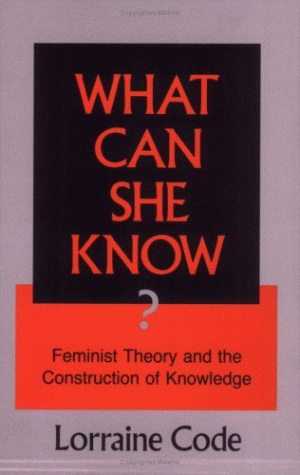Four quotations from Canadian philosopher Lorraine Code’s What Can She Know? Feminist Theory and the Construction of Knowledge.
1. On how perceptual knowledge is gendered:
“Proposing that the sex of the knower is significant casts doubt both on the autonomy of reason and on the (residual) exemplary status of simple observational knowledge claims. The suggestion that reason might function differently according to whose it is and in what circumstances its capacities are exercised implies that the manner of its functioning is dependent, in some way, on those circumstances, not independent from them. Simple perceptual examples are rendered contestable for their tendency to give a misleading impression of how knowledge is constructed and established and to suppress diversities in knowledge acquisition from the varied circumstances — for example, the sex — of different knowers.”
2. On why the desire for objectivity is a uniquely male consequence of anxiety:
Citing the work of two psychoanalytic feminists: “For both Scheman and Bordo, these moves to ensure certainty in knowledge evince a need to guard against the anxiety consequent on a radical separation from the world. For both, that anxiety is characteristic of (stereotypically conceived) male experience. Scheman claims that the ambivalence that permeates Othello and the Meditations is inevitable in a world where men are expected to dominate women. The need to ward off ambivalence prompts an anxiety that urgently seeks objectivity. Drawing on psychoanalytic literature, Scheman contents that this ambivalence has its source in a conflict between an infantile dependency on, and an equally strong desire to be independent from, the mother.”
3. On why females do not suffer such anxiety and so do not feel the need for objectivity:
“The structures of the conflict are different for female children, who are not expected, in dominant privileged western cultures, to separate from their mothers as male children are but are encouraged to maintain connection, identification, and a level of dependence.”
4. On how maleness and whiteness come to be generalized:
“But attributions of essential maleness efface differences among men and claim a natural necessity for characteristics that are in fact typical only of an elite group of white men in specific positions of power, property, and political privilege.” (53)
Source:
Lorraine Code, What Can She Know? Feminist Theory and the Construction of Knowledge (Cornell University Press, 1991).

